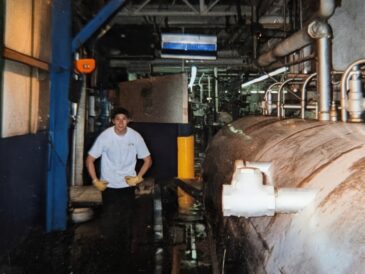Fischer: Your final residence — literally, your final residence

Photo supplied, Jen Fischer
Jen FischerIt has been said that nothing in life is certain except death and taxes. I’m not particularly interested in discussing taxes, a topic that is at the forefront of my mind every time I spend a dime, and, truthfully, death isn’t my favorite topic either. I’m hoping to have a little more life left in this body. I do, however, want to talk about what comes after — not the afterlife, the pearly gates or the great beyond. I mean the real estate, the final plot, the last address you will ever have. Yet as cities grow, land becomes scarce and populations increase, we’re running into an uncomfortable truth; we are out of space. Even as people are literally dying to get it, you might, even in death, be waitlisted.
The main problem here is that once planted, no one has been willing to move. It is a space that will never be vacated. In Utah, there are currently 673 cemeteries and burial sites. Most of these sites are nearly full. What happens then, when the grim reaper runs out of parking places? Unfortunately, he still shows up, but then so do the city planners to discuss ways to facilitate the rising population of dead people. The question of where to put the bodies goes deeper than it looks — 6 feet deeper, to be exact.
Traditional burials use chemicals that contain toxins to embalm bodies. These toxins can contaminate groundwater. Traditional burials are also very expensive and use valuable hard materials, such as wood or metal, to contain the body. These products take up additional space and are only used once, obviously. Although Utah law does not require a casket or vault, good luck finding a cemetery that will allow a nontraditional burial method.
Most cemeteries do offer the option of cremation. However, this also has an impact on the environment. A cremated body emits hundreds of kilograms of carbon dioxide as well as vaporized mercury from tooth fillings. Then what, pray tell, are we supposed to do with the urns or ashes? If you think you can just pop Aunt Betty’s ashes on the fireplace mantel or scatter them over her favorite rose garden, think again. In some places, that heartfelt farewell might actually be breaking the law.
What about recycling? It is always a good idea, in theory. Perhaps people who died 150 years ago or so and don’t get many visitors, could dig a little deeper (literally) for the next generation to be laid on top of them.
I have always told my loved ones to just dig a hole and shove me in when I die. I’m not kidding either. I don’t need an expensive, silk-lined box for my deceased body to idle in for the next several centuries. A dirt hole will be just fine. I promise. And I won’t come back to haunt.
There really is such an option. “Green burial,” as it is now called, is a natural burial in which no chemicals are used to preserve the body and decomposition is accelerated by use of compost coffins buried close to the surface which break down faster.
Even better is the option of becoming a tree. Not in the same way that reincarnation may work, rather, the body can be buried in a fetal position in a pod that is compostable. A tree is planted on top, and the decomposing body provides nutrients for the tree.
There are other options as well including donating the body to science (which would include a complimentary tattoo on the foot of the deceased which reads “property of Vanderbilt University” or wherever the body is going). Either way, as our cities grow and available space shrinks, the question of what to do with our final resting places remains as urgent as ever. We — the living — come from a culture that values having a place to visit, to remember, to connect with those we’ve lost. But the question of long-term real estate for the dearly departed isn’t going anywhere. If anything, it’s a growing concern that’s nowhere near proverbially dying.
Jen Fischer is an associate broker and Realtor. She can be reached at 801-645-2134 or jen@jen-fischer.com.



